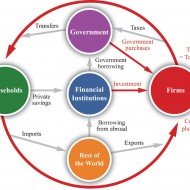Posted by Managementguru in Accounting, Economics
on Feb 17th, 2014 | 0 comments

National Accounting Concepts Why knowing about national accounting concepts is important? National income data are of great importance for the economy of a country. In modern days they are regarded as the accounts of an economy, which are known as social accounts. Social accounts tell us how the aggregate of a nation’s revenue, output and product result from the income of different individuals, products of industries and transactions of international trade. National policy formulations: The computation of national income forms a basis for a nation to develop its policies for important spheres of action such as employment policies, monetary policies and fiscal policies that determine the growth of an economy. These figures enable us to know the direction which the industrial output, investment, saving etc. take and proper measures can be adopted to bring the economy on the right path. Facilitates Planning: Gross Domestic Product Gross National Product Net Domestic Product Net National Product Per Capita Income Disposable Personal Income All these factors comprise the national income and indicate the money value of the flow of goods and services available annually in an economy. Also this statistics helps a nation for proper economic planning. The per capita income refers to the earning capacity of individuals in an economy and more the per capita income, higher is the economic welfare of a country. Uncontrolled population growth and unemployment are major reasons for low per capita income. The wealth cannot be evenly distributed owing to high birth rates and low mortality rates and making the ends meet with the available scant resources becomes a major problem for developing countries. Distribution of income From the data pertaining to wages, rent, interest and profits, we learn of the disparities in the incomes of different sections of the society. Similarly the regional distribution of income is revealed. It is only on the basis of these that the government adopts measures to remove inequalities in income distribution and attempts at regional equilibrium. There have been differences of opinion regarding ‘nation’ in the concept of national income. In the calculation process, the term ‘nation’ has to be defined exactly as to whether it is the geographical entity of the country to be taken up for computing national income or the incomes earned by the nationals including those residing abroad. Further, since everything has to be equated to the money value, services produced in the economy out of love for humanity cannot be brought under the term national income. Besides, there is an overlapping of occupations, especially in the rural sector of certain countries, which makes it difficult to know about incomes from various...

Posted by Managementguru in Economics
on Feb 17th, 2014 | 0 comments

Managerial Economics and Decision Making One has to observe the economic prospects of a particular #industry before venturing into it. Most of the people are not aware of the existence of some businesses with fantastic economic characteristics like high rate of return on invested capital, substantial profit margins and consistent growth. How do you think Bill Gates and Warren Buffet were able to make it on the Forbes top millionaires list? Successful leaders focus on the economics of a business for decision making. Economic Aspects of a Market Managerial economics is a #management science that gives you more idea about the economic aspects of a market and how they affect your decision making. This is very important because economic profits play a crucial role in a market based economy., While above normal profits are indicators of expansion and growth, below normal profits cautions you about tightening or retrenchment. Business economics is comprised of several tools of micro and macro economic analysis which are useful in management decision-making that act as facilitators to solve business problems. Micro economic instruments used in this context include demand analysis, production and cost analysis, breakeven analysis, theory of pricing, technical progress, location decisions and capital budgeting . Factors Influencing Management Decisions The macroeconomic concepts that are directly or indirectly related to management decisions include analysis of national income, business cycles, monetary policy, fiscal policy, central banking, public finance, economic growth, international trade, balance of payments, protectionism, free trade, exchange rates and international monetary system. The scope of management science is broad and is closely linked with economic theory, decision sciences and accounting. Traditional economics deals with theory and methodology of management, while managerial or business economics applies these theories to solve business problems. The tools and analytical techniques are useful in providing optimal solutions to business problems. Relationship with economics : Managerial economics borrows concepts from economics to idealize the strategic actions needed for decision making in a problem situation. The analysis of micro and macro economic concepts adds valuable information for the organization. Say, for example, national income forecasting is an important aid for the analysis of business conditions that in turn could be an invaluable contribution to forecast demand for specific product groups. Theories of market structure can be analyzed for market segmentation. Managers have the freedom to choose between the decision alternatives that best suits the objectives of the business enterprise. The challenge is to justify the alternative in terms of cost and benefit. Relationship with decision sciences : Decision models are created to format solutions for problem situations and the process uses techniques such as, optimization, differential calculus and mathematical programming. This also helps to analyze the impact of alternative courses of action and evaluate the results of the model. Economic models provide the organizations with the necessary insight concerning value maximization Relationship to Accounting The accounting data and statements constitute the language of business. The accounting profession has a significant impact on cost and revenue information and classification. A manager therefore must be familiar with the generation, interpretation and use of accounting data. Accounting is also seen as a decision management tool and not as a mere practice of book-keeping. The concepts and practices of accounting can be well applied to improve the economic scope of a project. Economic theory is all about allocating scarce resources between competing ends and managerial economics advocates rules for improving managerial decisions and for efficiently achieving the goals of an...




